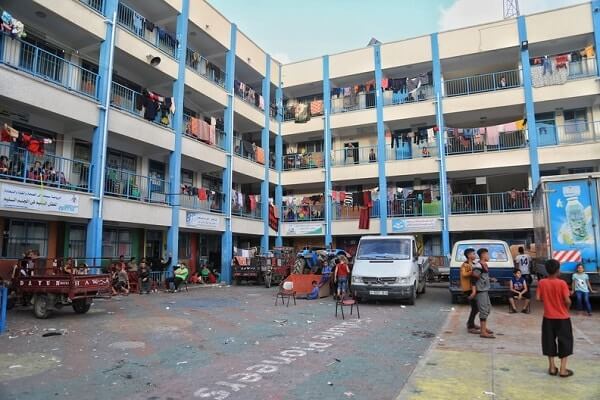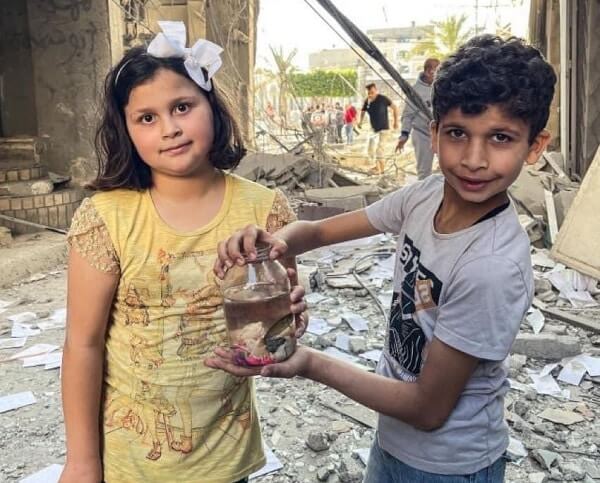Schools in Gaza had only recently begun reopening after COVID-19 when the recent escalation in violence shut them down again. For students, it was simply another disruption in their already disrupted lives.
For the past decade, I have been conducting research in Palestine for a range of humanitarian organisations and donors, and witnessing first-hand the realities of life of under occupation, particularly for children and their families.
From the narrow alleyways of the Old City of Jerusalem to the ramshackle streets of Gaza City, I’ve been amazed by the resilience of Palestinians in the face of occupation and oppression.
For many children in the West Bank, the very act of attending school each day is fraught. Those living near the wall separating Israeli and Palestinian-controlled territories, or close to Israeli settlements, face daily and humiliating searches by Israeli security forces on their way to and from school.
They also suffer physical or verbal abuse from settlers, and the prospect of live ammunition, tear gas or stun grenades being fired at or near their schools. There’s a constant threat of their schools being demolished or permanently closed by Israeli authorities.
It is estimated these conditions affected nearly 20,000 children in 2019.
Airstrikes turned Gaza’s schools into shelters. Officials fear Covid-19 may turn them into super-spreader centers. https://t.co/6OVCPwIMCV
— CNN (@CNN) May 20, 2021
COVID-19 and conflict
Ironically, the COVID-19 pandemic eliminated the physical risks of simply reaching and attending school. Recent research I conducted in partnership with the Norwegian Refugee Council showed children’s psycho-social well-being improved while schools were closed.
Why? Because they were able to participate in learning from the relative safety of their homes.
Since schools in the West Bank began to reopen in late January, however, dozens of children have been injured or arrested on their way to and from school as tensions rose over the illegal annexation of homes in East Jerusalem and raids by Israeli security forces on Al-Aqsa Mosque.
Until students and schools are protected from attack, it’s likely the decision to go to school will be determined by risk and insecurity.
Who will rebuild the Gaza Strip? And what obstacles stand in the way? https://t.co/lQ1vm5jZD9
— Post World (@PostWorld) May 22, 2021
School as sanctuary
For Gaza’s two million residents, a long economic blockade and past military escalations, as well as internal conflict between Hamas and the Palestinian Authority, had already severely limited livelihoods, basic services and even food.
Then COVID-19 hit with a vengeance in August 2020, forcing children to learn from home when electricity and internet access were sporadic, food insecurity and unemployment were skyrocketing, and domestic violence was far too common.
Our research found less than half of these children were able to engage in any form of learning from home during this period. Only 30% of the children we surveyed had a positive outlook on the future, with just one in five feeling safe at home.
Even before the latest escalation, children’s psycho-social well-being was at an all time low.
Schools in Gaza are often places of social connection, sanctuary and self-expression for young people, particularly adolescent girls. COVID-19 and then the latest outbreak of fighting have conspired against this source of hope.

An ephemeral ceasefire
In the coming weeks and months we’ll witness the international community rush in to provide emergency support to the children of Palestine. But while food, medicines (including sorely needed vaccines), cash relief, temporary shelters, educational materials and mental health support are all needed, on their own they are not enough.
If another generation of Palestinian youth is to be saved from the conflict, the systems and structures that have made young learners vulnerable in the first place must be reconfigured.
As a colleague from Gaza recently wrote:
As terrified as we are of the relentless air strikes, what terrifies me more is the silence of the aftermath. A silence that will allow the world to forget about us once again until the next round of hostilities, while we die a slow, anonymous death under the pretence of calm.
As the occupying power, Israel must sufficiently protect the rights of young people according to the UN Convention on the Rights of the Child. This includes guaranteeing young Palestinians unfettered access to an education free of attack, of the same quality afforded children in Israel.
Other governments must hold Israel to account on this. If not, all the rebuilding efforts of the international community in the years to come will be as ephemeral as the current ceasefire.
is a Senior Lecturer in Education at University of Auckland.
This article was first published in The Conversation, you can read it here.
READ ALSO: Kerala woman killed in Israel rocket attack
Link up with us!
Indian Link News website: Save our website as a bookmark
Indian Link E-Newsletter: Subscribe to our weekly e-newsletter
Indian Link Newspaper: Click here to read our e-paper
Indian Link app: Download our app from Apple’s App Store or Google Play and subscribe to the alerts
Facebook: facebook.com/IndianLinkAustralia
Twitter: @indian_link
Instagram: @indianlink
LinkedIn: linkedin.com/IndianLinkMediaGroup





